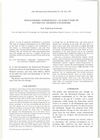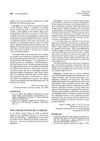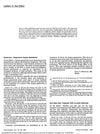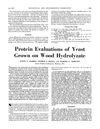 9 citations,
May 1989 in “Journal of the Royal Society of Medicine”
9 citations,
May 1989 in “Journal of the Royal Society of Medicine” An elderly woman's swollen, painful foot was found to be caused by a rare type of bone lymphoma, which improved with radiation treatment.
 8 citations,
May 1998 in “Journal of Oral and Maxillofacial Surgery”
8 citations,
May 1998 in “Journal of Oral and Maxillofacial Surgery” Acne is caused by increased sebum, abnormal skin shedding, bacteria, and inflammation, not dirt; treatments vary from creams to antibiotics or isotretinoin, with severe cases needing a dermatologist's care.

Low-dose oral isotretinoin improved hair loss and facial bumps in patients with a specific type of hair loss.
 7 citations,
January 2017 in “Clinical and medical investigations”
7 citations,
January 2017 in “Clinical and medical investigations” Suriname uses many plants for beauty, with potential for a beauty industry, but more evidence is needed for product effectiveness.
 7 citations,
July 1975 in “Acta dermato-venereologica”
7 citations,
July 1975 in “Acta dermato-venereologica” A patient with Rothmund-Thomson syndrome showed skin changes, hair loss, and dental defects but no cataracts or skeletal issues.
4 citations,
July 2021 in “Journal of dermatology & dermatologic surgery” Microneedling is a simple, affordable treatment that helps with scars, wrinkles, stretch marks, and hair growth by boosting collagen.
4 citations,
May 2021 in “Research Journal of Science and Technology” Hibiscus rosa sinensis shows promise for treating various health conditions and promoting hair growth.
 3 citations,
May 2018 in “Journal of nutritional health & food science”
3 citations,
May 2018 in “Journal of nutritional health & food science” Nutritional supplements can help manage hair loss and promote hair growth by strengthening hair roots and countering harmful effects of pollution, smoking, and deficiencies in vitamins and minerals.
 3 citations,
January 2014 in “Middle East African Journal of Ophthalmology”
3 citations,
January 2014 in “Middle East African Journal of Ophthalmology” A woman lost her hair after taking acyclovir, but it grew back when she stopped the medication.
 3 citations,
January 2012 in “Wageningen Academic Publishers eBooks”
3 citations,
January 2012 in “Wageningen Academic Publishers eBooks” Hair health depends on various factors and hair loss can significantly affect a person's well-being; understanding hair biology is key for creating effective hair care treatments.
 January 2024 in “Journal of lipid research”
January 2024 in “Journal of lipid research” Finasteride may lower cholesterol and slow heart disease progression.
 December 2023 in “Journal of materials chemistry. B”
December 2023 in “Journal of materials chemistry. B” A new nanoemulsion increases oxygen for hair cells, leading to better hair growth.
December 2023 in “Acta dermato-venereologica” Metformin might help treat certain skin conditions, but more research is needed.
September 2023 in “Pharmaceutics” The new face mask with Eflornithine can potentially reduce facial hair growth and moisturize skin.
 January 2022 in “Sustainable development goals series”
January 2022 in “Sustainable development goals series” The document concludes that significant investment in agricultural innovation is necessary to achieve global food security and nutrition.

Hair loss after weight loss surgery can improve over time.
 101 citations,
March 2019 in “Cell Stem Cell”
101 citations,
March 2019 in “Cell Stem Cell” Certain immune cells in the skin release a protein that stops hair growth by keeping hair stem cells inactive.
54 citations,
April 2007 in “Gastroentérologie clinique et biologique” Bariatric surgery can worsen nutritional deficiencies, requiring careful monitoring and supplementation.
 39 citations,
May 2011 in “Human Immunology”
39 citations,
May 2011 in “Human Immunology” Genetics play a role in acne, but how exactly they contribute is not fully understood.
 38 citations,
August 2005 in “Veterinary dermatology”
38 citations,
August 2005 in “Veterinary dermatology” A disease causing skin issues in young adult German short-haired pointers is hereditary, with most affected dogs not responding to treatment.
 22 citations,
June 2004 in “Journal of The European Academy of Dermatology and Venereology”
22 citations,
June 2004 in “Journal of The European Academy of Dermatology and Venereology” A woman had both Graham Little-Piccardi-Lassueur syndrome, causing hair loss, and complete androgen insensitivity syndrome, making her genetically male but physically female. This suggests androgens don't affect the hair loss condition.
 18 citations,
June 2019 in “Clinical research in dermatology”
18 citations,
June 2019 in “Clinical research in dermatology” Acne can't be cured but can be managed with treatments like benzoyl peroxide and diet changes; it's costly and can lead to scarring and mental health issues.
 16 citations,
April 2011 in “Journal of The American Academy of Dermatology”
16 citations,
April 2011 in “Journal of The American Academy of Dermatology” Dermatologists play a key role in identifying and documenting signs of abuse and injury for forensic investigations.
 14 citations,
November 1987 in “Journal of The American Academy of Dermatology”
14 citations,
November 1987 in “Journal of The American Academy of Dermatology” A woman developed a severe skin reaction called toxic epidermal necrolysis after taking the antibiotic cephalexin.
 13 citations,
August 1982 in “Archives of dermatology”
13 citations,
August 1982 in “Archives of dermatology” A new side effect of aromatic retinoid treatment is soft nails.
 13 citations,
July 1951 in “Industrial & Engineering Chemistry”
13 citations,
July 1951 in “Industrial & Engineering Chemistry” Yeast grown on wood sugar with added methionine could be a cheap alternative to animal protein for feed.
 10 citations,
April 2013 in “Veterinary dermatology”
10 citations,
April 2013 in “Veterinary dermatology” A new skin disease in four Labrador retrievers responded well to immunosuppressive treatment.
9 citations,
January 2013 in “BioMed research international” The conclusion suggests a new acne treatment that controls bacteria by reducing water in the skin's pores using sugar-like substances.
 7 citations,
May 2022 in “International Journal of Environmental Research and Public Health”
7 citations,
May 2022 in “International Journal of Environmental Research and Public Health” Isotretinoin therapy for acne can cause many reversible side effects, mainly mild skin conditions, and patient understanding of these effects can improve treatment adherence.
 7 citations,
February 2018 in “International Journal of Pharmaceutics”
7 citations,
February 2018 in “International Journal of Pharmaceutics” Researchers developed a method to measure drugs in hair follicles and found that both water-loving and fat-loving drugs can be detected after being applied to the skin.
























